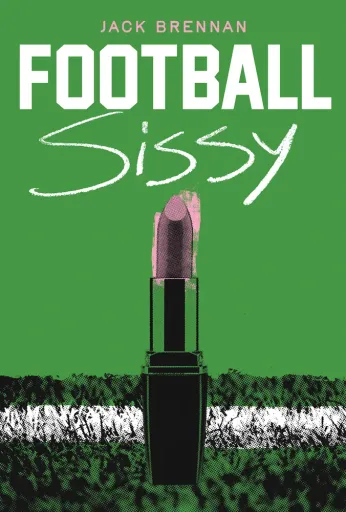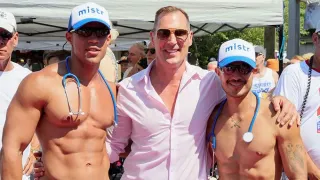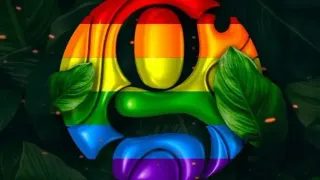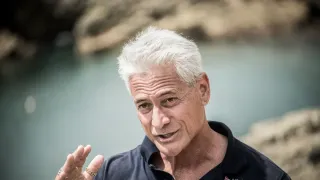
6 hours ago
Author Jack Brennan Reflects On Childhood Secrets With "Football Sissy"
Steve Duffy READ TIME: 3 MIN.
“From the gridiron to the page, Jack Brennan reclaims the word ‘sissy’ and proves that living your truth is the bravest play of all.”
In Jack Brennan’s decades-long career, he covered teams like the MLB’s Reds and the NFL’s Cincinnati Bengals, before becoming the PR director for the Bengals. He wrangled sports stories, reporters, and players. At home, he played basketball with the neighborhood husbands and raised three kids with his wife, to whom he was devoted. At the same time, he had a passion that never left him: he liked dressing as a woman. Blonde silky hair, bright
lips, smooth legs escaping short skirts, ending in heels as high as they go.
While he kept his life as a crossdresser private, eventually his world opened up, and he came out publicly via The Athletic in 2021. Football Sissy offers a view of his dual lives, and the slow build of his decision to become one of the first men in the NFL to come out as LGBTQ+.
The story follows his childhood experiences, the thrills of his career, the messy entanglements he got into (including being accosted by the police for breaking into his own home), and his coming to terms with his own biases and misapprehensions. Told with the characteristic humor of Brennan’s sports columns, Football Sissy is a riveting inside peek at life inside the NFL, and a heartwarming tale of acceptance and love, even within the most masculine environments.
In this candid conversation, Jack reflects on the journey behind Football Sissy—from childhood secrets to the courage of finally stepping into the spotlight and sharing his full truth.
EDGE: What inspired you to write Football Sissy, and what was the turning point that made you feel ready to share your story publicly?
JB: As I got into retirement, I got less afraid of coming out, and I consider myself a writer at heart. Over the years, people have asked me many times when I am going to write a book. Not only from my family, but these questions were on the mind of many people – “Why are you writing this book and why do you need to tell us this?” Thinking back to a conversation I had with my brother-in-law early on. He's an older guy who grew up as a fairly conservative Catholic. My sister, who is my best friend, and I were into this book. I told her about it very early on. At their house in Atlanta, I was talking about it with her and her husband, Frank, and he seemed a little unhappy to have found this out. He asked, “Why are you telling me this? Do we need to tell everybody everything about ourselves? Aren't there some things that might be better to own?” I told him if I own this part of myself as real, then as a close friend or close relative, I should be able to share the whole me with you. I should not have to lie or hide who I am. So, for anyone who questions why I wrote this, that is my answer.
EDGE: When did you start cross-dressing?
JB: I was three years old. That was the first time I felt the urge, and it never went away.
EDGE: What was the hardest chapter to write?
JB: I was told by many throughout the writing process that publishing a memoir is a very competitive field. You've got to really let it hang out and don't hold anything back. Was it a bit scary to share a secret? Yes, but it was liberating to share it as well.
EDGE: How has your relationship with your family evolved since publicly coming out?
JB: Really, there's no story there. My family has always supported me, led by Valerie, my wife of 52 years. There were some parts that might've been cut out, but it had been a while since everyone in the family knew about them. Still, it seemed like an awkward subject to discuss. So the subject might be quickly switched, and maybe it still is awkward now. I had deep discussions about it. I've informed the family, particularly my granddaughters who are interested, and their parents, that this book contains a lot of adult content. Kids don't want to know what their parents do in the privacy of the bedroom. My advice was to be prepared, as some of the things I tell might be difficult to hear and read.
EDGE: Did writing the memoir change how you see yourself?
JB: I don't think so. I was just writing about my experiences and all the crazy, convoluted, and strange things that came my way. I always had a strong urge to cross-dress, and I just wanted to share my truth.

EDGE: Sports are often associated with hypermasculinity. How did the broader sports community respond to your truth?
JB: I haven't had really any real negative reaction. Mike Brown, the owner of the Bengals and my boss for 24 years, needed to be informed early on because the Bengals held the rights to a photo I wanted to use when my story originally came out. I knew a normal routine photo request would get to him, so I told him directly, and he was very gracious and fine. Marvin Lewis, the Bengals head coach, whom I really like and admire a lot, was also fine. Boomer Esiason, former Bengals QB, Cris Collinsworth, NBC Sunday Night Football, and Phil Simms, Super Bowl XXI MVP, became endorsers with blurbs on the book. When they all knew the story, they were all so supportive and told me that if there was anything they could do to help, they would. All the PR directors in the NFL, even some who I know to be very conservative, were supportive. Paul Dockerty, the columnist at the Cincinnati Inquirer and the number one sportswriter in Cincinnati. He and his editors decided they wanted to do a column, too, but they shut down the reader comment function. I think there were about 30 comments, with about 15 being supportive and the rest ranging from snarky to pretty nasty, but that wasn't too hard to deal with.
EDGE: In queer culture, the word “sissy” has a complex history. How did you decide to embrace it in your title and your truth?
JB: As a boy growing up in Texas, there was nothing worse you could be called than a “sissy.” I was never called, but I knew that if my truth was known, I would have been. When I was thinking of a title for the book, I had a gay friend get a little bit upset about the title. He told me that he hated the word so much and he wished if wouldn't use it. He said, “You're not a sissy. You're strong and brave.” He told me he was called a sissy, and it hurts. During the final stages of making that decision, I was talking with my youngest daughter about a conversation she had with a friend about the title, and her friend suggested Skirting the Norm. I thought it was a clever idea. Then my daughter's friend said, “If I saw Skirting the Norm on the shelf at a bookstore, I might look at it, but if I saw Football Sissy, I would pick it up and look at it. So, the word has punch to it for better or for worse, and that is what felt true. Also, I believe adopting that term and accepting it robs it of its power.
EDGE: Many LGBTQ+ readers carry shame from their youth. What would you say to the queer kid who feels like they don't belong on the field — or anywhere?
JB: Just look at all the people who've come out before you, because it does get better. It will get better. We've hit a speed bump here with MAGA, but it'll start getting better again when we finally get through these next few years. I did an interview around Pride Month, and I was asked, “What does pride mean to you?” I said, “Pride means leading with the part of full personality and confidently knowing that shaming is all bullshit and unfounded. Sometimes you'll feel beaten down by it, but don't let it consume you. Keep that part of you that knows it's bullshit and lead with love and confidence.”
EDGE: How do you think your story might help challenge the toxic aspects of masculinity often reinforced in sports?
JB: I like to think it could challenge it because I had a pretty good career in sports. I was respected by my colleagues. Our department won the Pete Rozelle Award one year, voted by the media as the top PR department in the NFL. I was seen as a regular guy. One of my favorite lines from the book is in the NFL, where the presumption that you are straight is equal to the presumption that you hail from earth and not Mars. I know I surprised a number of people, and I surprised a lot of people when I came out. I hope it will knock down the stereotypical wall that queer people can and do belong in the NFL.
EDGE: Who do you hope reads Football Sissy — and what do you hope they take away from it?
JB: My biggest hope would be that queer people who feel shamed won't. If I can share my story with the world without shame, then my hope is that you will feel proud and be free to be yourself regardless of what others think or say. Always stand in your truth without shame.
Football Sissy: A Cross-Dressing Memoir is available now wherever books are sold, including Amazon, Barnes & Noble, and select independent bookstores.






